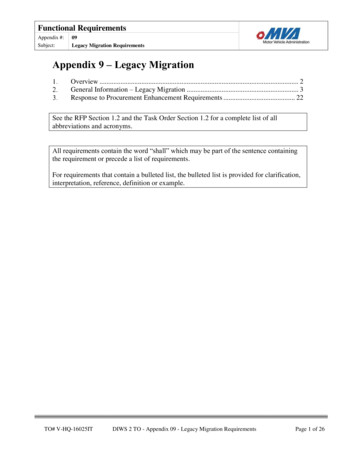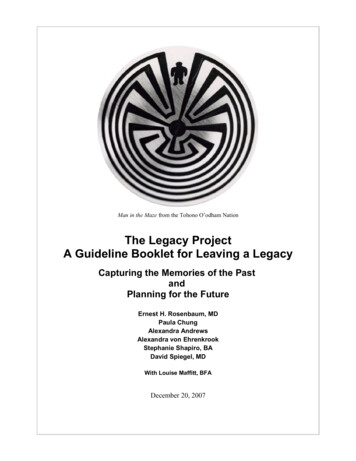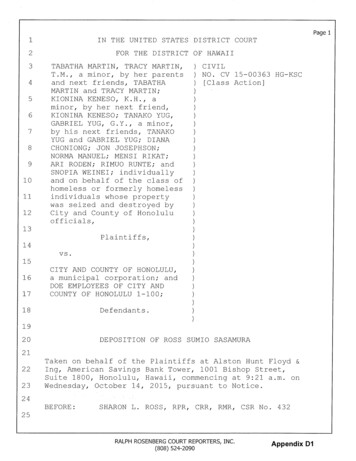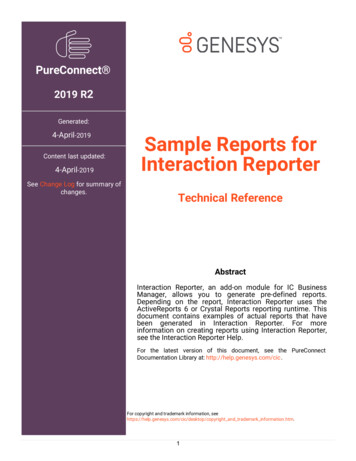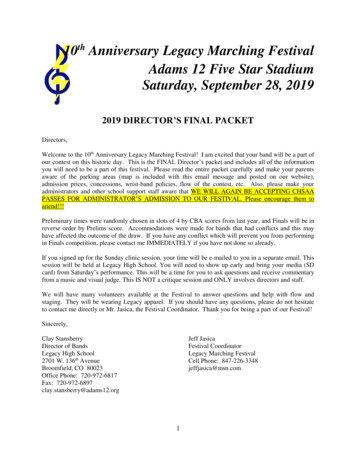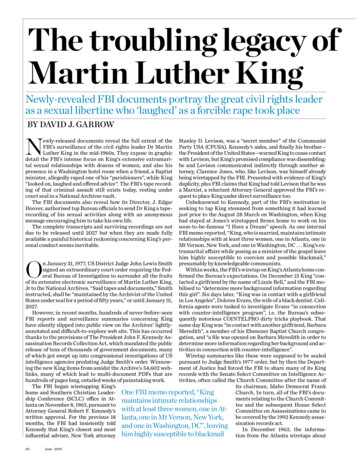
Transcription
The troubling legacy ofMartin Luther KingNewly-revealed FBI documents portray the great civil rights leaderas a sexual libertine who ‘laughed’ as a forcible rape took placeBy David J. GarrowNewly-released documents reveal the full extent of theFBI’s surveillance of the civil rights leader Dr MartinLuther King in the mid-1960s. They expose in graphicdetail the FBI’s intense focus on King’s extensive extramarital sexual relationships with dozens of women, and also hispresence in a Washington hotel room when a friend, a Baptistminister, allegedly raped one of his “parishioners”, while King“looked on, laughed and offered advice”. The FBI’s tape recording of that criminal assault still exists today, resting undercourt seal in a National Archives vault.The FBI documents also reveal how its Director, J. EdgarHoover, authorised top Bureau officials to send Dr King a taperecording of his sexual activities along with an anonymousmessage encouraging him to take his own life.The complete transcripts and surviving recordings are notdue to be released until 2027 but when they are made fullyavailable a painful historical reckoning concerning King’s personal conduct seems inevitable.Stanley D. Levison, was a “secret member” of the CommunistParty USA (CPUSA). Kennedy’s aides, and finally his brother—the President of the United States—warned King to cease contactwith Levison, but King’s promised compliance was dissembling:he and Levison communicated indirectly through another attorney, Clarence Jones, who, like Levison, was himself alreadybeing wiretapped by the FBI. Presented with evidence of King’sduplicity, plus FBI claims that King had told Levison that he wasa Marxist, a reluctant Attorney General approved the FBI’s request to place King under direct surveillance too.Unbeknownst to Kennedy, part of the FBI’s motivation inseeking to tap King stemmed from something it had learnedjust prior to the August 28 March on Washington, when Kinghad stayed at Jones’s wiretapped Bronx home to work on hissoon-to-be-famous “I Have a Dream” speech. As one internalFBI memo reported, “King, who is married, maintains intimaterelationships with at least three women, one in Atlanta, one inMt Vernon, New York, and one in Washington, DC . . . King’s extramarital affairs while posing as a minister of the gospel leavehim highly susceptible to coercion and possible blackmail,”n January 31, 1977, US District Judge John Lewis Smith presumably by knowledgeable communists.signed an extraordinary court order requiring the FedWithin weeks, the FBI’s wiretap on King’s Atlanta home coneral Bureau of Investigation to surrender all the fruits firmed the Bureau’s expectations. On December 15 King “conof its extensive electronic surveillance of Martin Luther King, tacted a girlfriend by the name of Lizzie Bell,” and the FBI moJr to the National Archives. “Said tapes and documents,” Smith bilised to “determine more background information regardinginstructed, shall be “maintained by the Archivist of the United this girl”. Six days later, “King was in contact with a girlfriendStates under seal for a period of fifty years,” or until January 31, in Los Angeles”, Dolores Evans, the wife of a black dentist. Cali2027.fornia agents were tasked to investigate Evans “in connectionHowever, in recent months, hundreds of never-before-seen with counter-intelligence program”, i.e. the Bureau’s subseFBI reports and surveillance summaries concerning King quently notorious COINTELPRO dirty tricks playbook. Thathave silently slipped into public view on the Archives’ lightly- same day King was “in contact with another girlfriend, Barbaraannotated and difficult-to-explore web site. This has occurred Meredith”, a member of his Ebenezer Baptist Church congrethanks to the provisions of The President John F. Kennedy As- gation, and “a file was opened on Barbara Meredith in order tosassination Records Collection Act, which mandated the public determine more information regarding her background and acrelease of tens of thousands of government documents, many tivities in connection with counter-intelligence”.of which got swept up into congressional investigations of USWiretap summaries like these were supposed to be sealedintelligence agencies predating Judge Smith’s order. Winnow- pursuant to Judge Smith’s 1977 order, but by then the Departing the new King items from amidst the Archive’s 54,602 web- ment of Justice had forced the FBI to share many of its Kinglinks, many of which lead to multi-document PDFs that are records with the Senate Select Committee on Intelligence Achundreds of pages long, entailed weeks of painstaking work.tivities, often called the Church Committee after the name ofThe FBI began wiretapping King’sits chairman, Idaho Democrat Frankhome and Southern Christian Leader- One FBI memo reported, “KingChurch. In turn, all of the FBI’s docuship Conference (SCLC) office in At- maintains intimate relationshipsments relating to the Church Commitlanta on November 8, 1963, pursuant totee and the subsequent House SelectAttorney General Robert F. Kennedy’s with at least three women, one in At- Committee on Assassinations came towritten approval. For the previous 18 lanta, one in Mt Vernon, New York,be covered by the 1992 Kennedy assasmonths, the FBI had insistently toldrecords act.and one in Washington, DC”, leaving sinationKennedy that King’s closest and mostIn December 1963, the informainfluential adviser, New York attorney him highly susceptible to blackmailtion from the Atlanta wiretaps aboutO30June 2019
BETTMANN/GETTY IMAGESMartin Luther King arrives at the FBI to speak with J. Edgar Hoover on December 1, 1964. Their meeting was highlypublicised, but evasive and dishonest on Hoover’s partKing’s expansive private life whetted the FBI’s appetite for recordings more intrusive and graphic than could be obtainedvia telephone lines. Knowing how frequently King travelled tomajor US cities, the FBI resolved to plant microphone bugs inhis hotel rooms. In this endeavour the prime decision-makerwas not long-time FBI Director J. Edgar Hoover but AssistantDirector William C. Sullivan, head of the Domestic Intelligence Division. With Supreme Court oral arguments in a casefrom Alabama, New York Times Co v. Sullivan—in which fourblack clergy supporters of King, plus the newspaper, had beensocked with a 500,000 state court judgment—scheduled forJanuary 6 and 7, 1964, King and a variety of ministerial friendswere scheduled to be in Washington, DC, for a three-night stay.Immediately after the new year, FBI Washington Field Officesecurity supervisor Ludwig Oberndorf summoned the office’ssenior “sound man”, Special Agent Wilfred L. Bergeron, aswell as Special Agent William Welch, the office’s “hotel contactman”. Waiting in Oberndorf’s office was Assistant Director Sullivan, who told the assembled agents that “FBI interest in Kingwas a national security matter” on account of his “communistcontacts”, Bergeron told Church Committee interviewers inanother newly-available document.Welch had ascertained that King and his party would bestaying at the historic Willard Hotel, on Pennsylvania Avenuejust east of the White House, and Welch introduced Bergeronto a Willard manager who arranged for Bergeron to “survey”the rooms in question. Bergeron then “placed a transmitter ineach of two lamps and then through the hotel contact, it was arranged to have the housekeeper change the lamps in two roomswhich had been set aside for King and his party”. In two othernearby rooms Bergeron and fellow Special Agent William D.Campbell set up “radio receivers and tape recorders” prior towhen King and his friends first checked in on January 5. Staying in one of the two targeted rooms was King’s friend LoganKearse, the pastor of Baltimore’s Cornerstone Baptist Churchand, like King, the holder of a PhD from the Boston University School of Theology. Kearse “had brought to Washingtonseveral women ‘parishioners’ of his church”, a newly-releasedsummary document from Sullivan’s personal file on King relates, and Kearse invited King and his friends to come and meetthe women. “The group met in his room and discussed whichwomen among the parishioners would be suitable for natural orunnatural sex acts. When one of the women protested that shedid not approve of this, the Baptist minister immediately andforcibly raped her,” the typed summary states, parentheticallyciting a specific FBI document (100-3-116-762) as its source.“King looked on, laughed and offered advice,” Sullivan or one ofhis deputies then added in handwriting.While that claim appears only as an annotation, other similar marginalia, e.g. “more on this” one page prior, suggest fStandpoint31
that Sullivan was seeking an expandby to carry out photographic sured, more detailed indictment of King’s Stanley Levison, a “secret” memberveillance in public areas as well. Onbehaviour. The document’s recently- of the Communist Party, gave KingFebruary 23 they snapped picturesreleased final pages, narrating events 10,000 in cash in two years, theof “Wyatt Walker, Dolores Sheffey,until March 30, 1968, suggest that theDorothye Boswell and Martin Luunfinished revision was abandoned equivalent of 87,000 today, whichther King, Jr and Dolores Evans”;following King’s assassination on April was only discovered by an IRS probethe following day they filmed movie4. Without question Sullivan and hisfootage of King and Evans at the Hyaides had both the microphone-transatt House. Assistant Director Sullimitted tape-recording, and a subsequent full transcript at hand van himself telephoned the Los Angeles office for updates, withwhile they were annotating their existing typescript; in 1977 the Special Agent in Charge (SAC) explaining that televisionJustice Department investigators would publicly attest to how noise plus jet planes made for less-than-ideal audio recordings.their own review of both the tapes and the transcripts showed Los Angeles also notified Sullivan that Evans and her husbandthem to be genuine and accurate. Throughout the 1960s, when Theodore “are both scheduled to appear in court on March 4,no precedent for the public release of FBI documents existed or 1964, concerning the granting of the interlocutory decree of diwas even anticipated, Sullivan could not have imagined that his vorce”.and his aides’ jottings would ever see the light of day. Similarly,Back in Atlanta, the SCLC office wiretap memorialisedthey would not have had any apparent motive for their annota- King’s friend Barbara Meredith recounting how at a small partions to inaccurately embellish upon the actual recording and ty “King got very drunk and made uncomplimentary remarksits full transcript, both of which remain under court seal and about some of the SCLC personnel”. At FBI headquarters, deone day will confirm or disprove the FBI’s summary allegation. sire for comprehensive scrutiny of King led to a tardy discoveryAt the Willard Hotel, King and his friends’ activities re- that would have received far more attention had not executivessumed the following evening as approximately 12 individuals become so preoccupied with King’s personal life. Supervisor“participated in a sex orgy” which the prudish Sullivan felt in- Seymor Fred Phillips, who had direct charge of the King case,cluded “acts of degeneracy and depravity . . . When one of the recommended to Sullivan that they obtain King’s tax returnswomen shied away from engaging in an unnatural act, King and from the Internal Revenue Service, and when King’s IRS fileseveral of the men discussed how she was to be taught and initi- arrived in mid-March, it contained a previously unreportedated in this respect. King told her that to perform such an act bombshell: in 1957 and 1958, Stanley Levison, who had first metwould ‘help your soul’.” Sometime later, in language that would King only at the very end of 1956, had arranged for King to rereflect just how narrow Sullivan’s mindset was, “King an- ceive a total of 10,000 in cash gifts—the equivalent of 87,000nounced that he preferred to perform unnatural acts on women in 2019 dollars—from himself and a close friend, 70-year-oldand that he had started the ‘International Association for the Alice Rosenstein Loewi. In early 1961, the IRS had subjectedAdvancement of Pussy Eaters’.” Anyone familiar with King’s King’s late 1950s’ returns to “investigative scrutiny” and deoften-bawdy sense of humour would not doubt that quotation.termined that he owed an additional 1,556.02 but had had noAt FBI headquarters, an aide to the Bureau’s number three fraudulent intent.official, Alan H. Belmont, prepared a comprehensive summaryIn April, 1961, King, Levison, and Chicago attorney Chaunceyof the Willard recordings: “We do not contemplate dissemina- Eskridge, himself a former IRS agent, had met with an IRS intion of this information at this time but will utilise it, together vestigator, but only in response to subsequent questions rewith results of additional future coverage, in our plan to ex- garding “adjustments in King’s income” did King say that hepose King for what he is.” Hoover disagreed, instructing in his had received 5,000 in each of those two calendar years. “Thisdistinctive scrawl that White House liaison Cartha “Deke” sounded like a complete fabrication,” the investigator opinedDeLoach should show the summary memo to Walter Jenkins, in a December 12, 1961 memo, and seeing this information forPresident Lyndon Johnson’s top aide.the first time more than two years later, J. Edgar Hoover asked:Within 24 hours of King’s return to Atlanta from the Willard, “Doesn’t IRS intend to take some action?” No, a liaison agenthis wiretapped home phone gave the Bureau more raw material. reported, but “King’s current income tax return will be scruKing used a modest apartment at 3006 Delmar Lane NW, rented tinised very carefully to determine whether any violations apin the name of aide Fred Bennette, as a hideaway, and there on pear.” Hoover responded: “What a farce!”January 8 King met alone with the woman to whom he had bePhillips prepared an unremarkable memo to Attorney Gencome closest, SCLC citizenship education staffer Dorothy Cot- eral Robert F. Kennedy reporting the new IRS information, button. Four days later “King was in contact with another girlfriend only in the fifth paragraph, on page two, was Levison’s responin New York by the name of Effie”, whom the FBI quickly identi- sibility for the 10,000 in gift income to King finally cited. Infied. In early February agents listened in as “King’s wife became retrospect, the FBI’s failure to highlight Levison’s remarkableupset and berated King for not spending enough time at home munificence towards his new friend is almost as startling as itswith her. This happened at a time when King was at Fred Ben- failure to similarly emphasise to Kennedy how those gifts hadnette’s apartment” and the wiretap indicated “he had Dorothy taken place simultaneously with Levison’s ongoing contribuCotton . . . in the apartment alone with him”.tions to the Communist Party. Levison’s substantial involvement in CPUSA fundraising through 1956, along with that ofhe Atlanta wiretaps kept the FBI fully apprised of King’s his twin brother Roy Bennett, has long been known, but FBIupcoming travels, and in mid-February King, SCLC aide documents emphasised how “as of January, 1957, Stanley LeviWyatt Walker and Baltimore’s Reverend Kearse all flew son and Roy Bennett were to become inactive in CP financialto Honolulu to rendezvous with Dolores Evans and at least one operations”. Although it previously has been known that Leother woman. A sound squad from the Bureau’s San Francisco vison and Bennett continued making personal contributionsoffice, with microphones already in place, awaited them at the to the CP until an explicit break in March, 1963, not until nowHilton Hawaiian Village. But King’s party tired of Honolulu have internal Bureau documents revealed the astonishingwithin 72 hours and flew to Los Angeles, where they spent one amounts involved: 25,000 in 1957, 12,000 in 1958, 13,000night at the Ambassador Hotel before moving to the Hyatt in 1959, 12,000 in 1960, 12,000 in 1961 and at least 2,500 inHouse near Los Angeles airport, where another squad of FBI early 1962. That total of 76,500 in 1960 dollars is the equivaagents quickly deployed in-room microphones while standing lent of more than 650,000 today.T32June 2019
William C. Sullivan: As head of the FBI’s Domestic IntelligenceDivision he had an intense fixation on King’s conductThe FBI’s failure ever to cite those figures in its warningmemos to Kennedy, coupled in March 1964 with its failure toemphasise Levison’s simultaneous large gifts to King, inexplicably rendered its “secret member” allegation against Levisonfar less powerful than could have been the case. To have a reported “secret member” writing some of King’s speeches, as theFBI highlighted to Kennedy, was one thing, but the remarkabledollar amounts Levison was bandying about could have madefor a much more striking portrayal than the FBI ever painted. BETTMANN / GETTY IMAGESBy March, 1964, when the FBI received the IRS information about King, it appears obvious in retrospect that Sullivan’s and Phillips’s intense fixation on King’s personalconduct had totally eclipsed their once-central concern overwhether Levison was exerting subversive influence on King.The extent of that preoccupation was underscored in mid-May1964, when the FBI’s Las Vegas office furnished headquarterswith a detailed memo a Nevada Gaming Control Board agenthad prepared after learning what had transpired when King,Wyatt Walker, and a Los Angeles minister friend had visitedLas Vegas three weeks earlier.Agent William H. Been had heard rumours that King hadpatronised a local prostitute and decided that given King’s “position as a God-fearing man of the cloth . . . perhaps a casual inquiry made to the prostitute in question might shed an interesting side light to King’s extra-curricular activities”. At 3 a.m. onMay 16 Been met Gail LaRue, a married 28-year-old who had leftfour children from a prior marriage in Sheridan, Wyoming. Gailexplained that at 2 a.m. on April 27, a hotel bellman had askedher to go to the New Frontier Hotel and see the well-known blackgospel musician Clara Ward, whose Clara Ward Singers wereperforming there. In the lobby, Ward handed Gail 100 and toldher: “I have a couple of friends in town that would like to meet youand have you take care of them.” Ward said “she was paying Gail. . . because these two men did not believe in paying a girl for herservice and for Gail to keep quiet about receiving any money.”Clara took Gail to the bar at the Sands Hotel and made acall on the house phone. Martin Luther King then appeared inthe bar and took both women to his room, where all three began drinking. King phoned one of his colleagues and told himto “get your damned ass down here because I have a beautifulwhite broad here”. Then “both the Rev King and Clara Wardstripped naked and told Gail to do the same.” With Gail seatedin a chair, “King went down on his knees and started nibblingon her right breast, while Clara Ward did the same with her leftbreast. Gail then stated, ‘I guess the Reverend got tired of thatand put his head down between my legs and started nibbling on“that”.’ After a while he got up and told Clara Ward to try someof it, so Clara went down on Gail for a while. Gail stated, ‘I thinkClara Ward is queer’.”Then King had intercourse with Gail while Clara watched.“After what Gail stated seemed like hours, King rolled offand had another drink, then climbed back on for a second goaround.” After King paused again, his friend showed up, had adrink, and had intercourse with Gail “while both Clara Wardand the Rev King watched the action from a close-by position”,with Clara sometimes stroking Gail as well. “Gail then statedthat she was getting scared as they were pretty drunk and allusing filthy language and at last she told Clara Ward she wouldhave to go.” Clara informed King, who “then whispered in Gail’sear, ‘I would like to try you sometime again if I could get youaway from Clara’.”Been wrote that “Gail stated to this investigator that ‘thatwas the worst orgy I’ve ever gone through’,” and added thatshe had declined a subsequent request from Clara Ward to gettogether again. Been’s three-page memo made its way to theFBI’s Las Vegas SAC, who had it retyped and labelled “Secret”for direct transmission to J. Edgar Hoover. On May 23, Beenconducted a follow-up interview with Gail, and passed theadditional information to Bureau agents two days later. Gailvolunteered that both King and his friend had each asked herto perform oral sex on them with the words “Here—eat this,”which she claimed not to have done, but Been was dubious,telling the FBI that Gail “was not too emphatic in her denial”.In yet another direct report to Hoover, this one labelled “TopSecret”, Las Vegas agents reported that “a paramour of King’sfrom Los Angeles, Dolores Castillo”, was “known to havespent some time in King’s suite around midnight, April 26”,prior to King’s early-morning assignation with Gail LaRueand Clara Ward.Unsurprisingly, in late May the wiretap on King’s home telephone overheard a conversation in which “King and his wifehad an argument and information was brought out concerningKing’s extra-marital activities”. At headquarters, SupervisorPhillips expressed displeasure that Atlanta agents had waited48 hours before reporting what they had heard and instructedthem to “furnish the Bureau, by communication marked for thepersonal attention of Assistant Director William C. Sullivan,any tape available concerning the reported conversation” or“the most detailed transcript available”. Atlanta case agent BobNichols quickly sent the tape, explaining that “the pronouns‘he’ and ‘she’ used by both parties” made it “impossible to knowthe identities of the individuals to whom they are making reference”. Sullivan himself later wrote that Coretta King had toldher husband that he was “not fulfilling his marital ‘responsibilities’” and “that if he spent ten hours a month at home, thiswould be an exaggeration”. Sullivan added that King “told hershe should go out and have some sexual affairs of her own”.Three weeks later King called Dolores Evans and theyagreed to meet in Los Angeles on July 8. Soon after King fStandpoint33
Michael Ochs Archives/Getty Images)returned to Atlanta, a Ms Ruby Hubert of Los Angeles calledhim on SCLC’s wiretapped lines “and berated him for not seeing her or calling her when he was in Los Angeles, Calif., recently. King gave the excuse that he was in a conference and couldnot talk to her.” That very same day King “contacted his ‘hideout’ and told Fred Bennette . . . that he was bringing DorothyCotton . . . out to the hideout in a few minutes”. The followingmonth, shortly before leaving for the Democratic National Convention in Atlantic City, New Jersey, “King told Dorothy Cottonthat he had contacted Fred Bennette and everything was OKfor the night of 8/19/64.”The “special squad” coverage that the FBI’s Deke DeLoachdeployed against civil rights advocates during the Democraticconvention at the behest of President Johnson has long been awell-known story in the annals of FBI abuses, but the newly-released documents add memorable details to this infamous tale.Special Agent Ben Hale was able to pose as NBC correspondent“Bill Peters” thanks to how Robert ‘Shad’ Northshield, a muchheralded television news executive from the 1950s until the1990s “and a long-time, well-established contact of my office,furnished us NBC credentials”, DeLoach boasted to Bureau superiors. The Bureau also deployed two of its few black agents,John M. Cary and William P. Crawford, to Atlantic City in “undercover assignment roles”. One of the men “successfully established contact with Dick Gregory”, the entertainer and activist,“and maintained this relationship throughout the course of theentire convention. By midweek, he had become one of Gregory’sconfidants.” The Johnson White House was highly impressed,and every agent involved received a financial reward.That same month, in another newly-available document, Assistant Director Sullivan told his boss, Alan Belmont, that theDomestic Intelligence Division would “develop highly placed,quality informants in certain legitimate organisations whoseactivities generally relate to racial matters”, such as the NationalAssociation for the Advancement of Colored People (NAACP),the Congress of Racial Equality (CORE), the Student NonviolentCoordinating Committee (SNCC), and King’s SCLC.Whether pursuant to that plan, or simply by happenstance,late in the summer of 1964 a young black man with an accounting background who had already worked as an FBI informantin both San Francisco and Little Rock moved to Atlanta and began “spending a lot of his spare time working on the books of theSCLC”, Atlanta Special Agent Donald P. Burgess wrote. James A.Harrison’s role as the FBI’s sole human informant inside SCLC’sAtlanta headquarters was first revealed by this author in 1981,but only now do new documents, available on the web followinga Freedom of Information Act request, reveal Harrison’s preexisting role as an FBI informant. On October 2 Agent Burgessrecounted how “Harrison has completely ingratiated himself inthe SCLC and is considered a staff member at present . . . Harrison has met and been in the home of Martin Luther King, Jr,and apparently meets with the approval of King.” At least weekly,Harrison informed Atlanta agents what was happening at SCLC,but his early reports featured only mundane office gossip.On Wednesday, November 18, J. Edgar Hoover told agroup of women reporters that King was “the most notorious liar” in the US, ostensibly because of how Kinghad criticised southern FBI agents two years earlier. Hooveradded “off the record” that King “is one of the lowest charactersin the country”, but the “notorious liar” characterisation generated widespread headlines. King responded with a telegramtelling Hoover that he was “appalled and surprised at your reported statement maligning my integrity” and with a publicstatement asserting that the 69-year-old Hoover “has apparently faltered under the awesome burden, complexities and responsibilities of his office”.34June 2019Dorothy Cotton in October 1963: The most important woman inKing’s life never explicitly discussed her relationship with himKing professed “nothing but sympathy for this man whohas served his country so well,” but in wiretapped phone conversations that were quickly passed to FBI headquarters, Kinginstructed aides to ask civil rights allies to speak out so thatHoover would be “hit from all sides.” Hoover complained to hisown aides that “I can’t understand why we are unable to get thetrue facts before the public” and that “we are never taking theaggressive.”Now, more newly-available documents offer a far more detailed account of what then transpired on Saturday November21 in what would become the most notorious episode in theFBI’s pursuit of King. At the Domestic Intelligence Division’soffices on the eighth floor of the Riddell Building at 1730 KStreet, Washington, Supervisor Seymor Phillips had possessionof all the reel-to-reel tapes from the hotel room microphonesurveillances on King. Early that morning Assistant DirectorSullivan instructed FBI Laboratory supervisor John M. Matterto prepare multiple composite copies containing what Mattercalled “highlights” from the Willard Hotel and Los Angeles Hyatt House recordings. Soon thereafter, as Phillips recalled in alengthy, never before cited recollection of that day’s events, Sullivan, whose office “was directly across the hall” from his, “cameinto my office and asked me for some unwatermarked stationery”. Then, “later that morning”, Sullivan “telephoned me forthe address of the Southern Christian Leadership Conferenceheadquarters in Atlanta”. Phillips jotted it down and took it toSullivan, who was busy typing and again sought assurance thatthe stationery Phillips had given him was unwatermarked.
Phillips went on: “Around noon, Sul- The FBI’s anonymous letter sentson with the Church Committee, alivan called me into his office and handcommittee request that the Bureaued me a sealed manila envelope which with the tape warned King that “you survey the personal files that Williamappeared to contain something other will find on the record for all time”Sullivan had left behind when Hooverthan written matter as it was a solid audio evidence of “your adulterousforced him into sudden retirement inpackage. He gave me a sum of money1971 led Phillips to make an historicand asked that I have one of the men acts, your sexual orgies” involvingdiscovery. On Sunday morning Januworking with me immediately take the “various evil playmates”ary 26, 1975, Phillips was asked topackage by cab to the Justice Building“inventory a drawer full of folders perand hand it over to Al Belmont,” whosetaining to King” among Sullivan’s paoffice was at “Main Justice” on Pennsylvania Avenue.pers. Therein he found “a document which I considered at theFrom there, the day’s events shift to a second narrator, whose time of extreme significance”, the original of an anonymous,April 1975 interview with Church Committee investigators is unsigned letter ostensibly written by one of “us Negroes” andalso among the newly-disclosed documents. Supervisor Lish addressed simply “King”. A heavily-redacted version of that letWhitson, one of the Domestic Intelligence Division’s most senior ter was later publicly released, and in time a fully unredactedagents, recounted how on that Saturday Sullivan had called him copy would become available too. But writing in early 1975,at home and told him that Hoover wanted him to take a package soon after discovering the original of that missive, Phillips exto Miami, one that only Sullivan, Deputy Director Cly
"King looked on, laughed and offered advice," Sullivan or one of his deputies then added in handwriting. While that claim appears only as an annotation, other sim - ilar marginalia, e.g. "more on this" one page prior, suggest f Martin Luther King arrives at the FBI to speak with J. Edgar Hoover on December 1, 1964. Their meeting was highly

